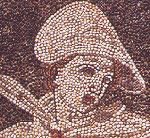First off, regarding those sentimentalists who opine about "lost cultures" — you know, the ones who say that "we have lost so much from the past" — to them I say, "What are you smoking?!" And to the honest ones among them I say, "Read these myths; you'll be shocked by just how NOT romantic and wise they are."
Having said that, and without going into a spirited critique of the many shortcomings of these early myths, I'll just note that none of them have a plot, and the reason seems clear. They appear to have no real concept of causation. Extraordinary things just happen randomly. Witness:
In a Tartar poem two heroes named Ak Molot and Bulat engage in mortal combat.... At last when the combat has lasted three years a friend of Ak Molot sees a golden casket hanging by a white thread from the sky and bethinks him that perhaps this casket contains Bulat's soul. So he shot through the white thread with an arrow and down fell the casket. He opened it and in the casket sat ten white birds and one of the birds was Bulat's soul. Bulat wept when he saw that his soul was found in the casket. But one after the other the birds were killed and then Ak Molot easily slew his foe. (The Golden Bough: A Study in Magic and Religion By James George Frazer, MacMillan, 1900)A golden casket just falls from the sky. Okay. How? Why? Caused by whom? No clue offered here.
For the longest time, I could not understand what motivated the characters to act in these early myths. Even when reacting to random phenomena falling from the sky, their actions still didn't seem to add up. But then I finally realized that the characters are treated in almost the same way as these phenomena. It isn't just that I don't understand their value system and therefore cannot see what motivates them — although this must explain some of my confusion. Mainly I just think that the characters have no real, goal-directed purpose at all.
Thus, a "hero" is no hero at all. X happens, and the "hero" responds by going on a random trip. Y happens, and he responds by falling over dead, maybe because of a curse, maybe because he ate a bad mushroom, maybe just because. Finally, Z happens and the "hero" comes back from the dead and avenges his cousin, then dies again. In a relatively "good" myth, he will die the second time because he fails to show gratitude toward the guy who brought him back from the dead. In a mediocre myth, he will die the second time because he stepped on a dirty shell and got sick. In a regular, everyday myth, he will just die again and no explanation will be given.
So, to what end were these stories perpetuated? Got me. Probably entertainment as much as anything. Nights were long, and TV hadn't been invented.
A lot of the stories do have a moral message, but the way the myths work is not to develop a compelling background for the moral message in order to give it more force. Rather, the myths often appear to be random; it could be any tale with any cast of characters. Thus, the messages in them tend to get tacked on like ornaments on a tree, which is to say, they appear as single sentences here and there, often completely out of the blue.
I have this image of a shaman who must teach his tribe certain lessons about life, and he has a limited set of stories to tell — maybe fifteen or twenty major story lines in his repertoire — which he retells over and over again. Each time, he just randomly intrudes on the story and says something like, "And that's when Raven took a holiday, and while he was visiting his grandmother, he killed her because she hadn't kept the house clean." And then he goes back to the story line, which has nothing whatsoever to do, really, with Raven and even less to do with Raven's grandmother.
I have read and studied and loved Homer over the years, especially the Odyssey. Now I appreciate just what an extraordinary development Homer was. I mean extraordinary! No wonder the Basques appear to have fallen in love with Greek myth from the moment they first heard it.
And finally, I will add that I am feeling sympathetic right now with the early shaman's plight. Driving a narrative along a complex chain of purposive action is no mean feat.



2 comments:
I've been in a number of role-playing games that ran under somewhat the same purpose. And people complain about "railroading" when I insist on having a coherent plot instead of just wandering around doing random things that make no sense. :P Well, those people can go play in someone else's game.
It's like cheating, in a way. The gamer (and the writer) gets out of a hard part, or even just a plain old boring part, by changing the circumstances on a whim. Funny, those kinds of reads aren't very satisfying after all.
Post a Comment